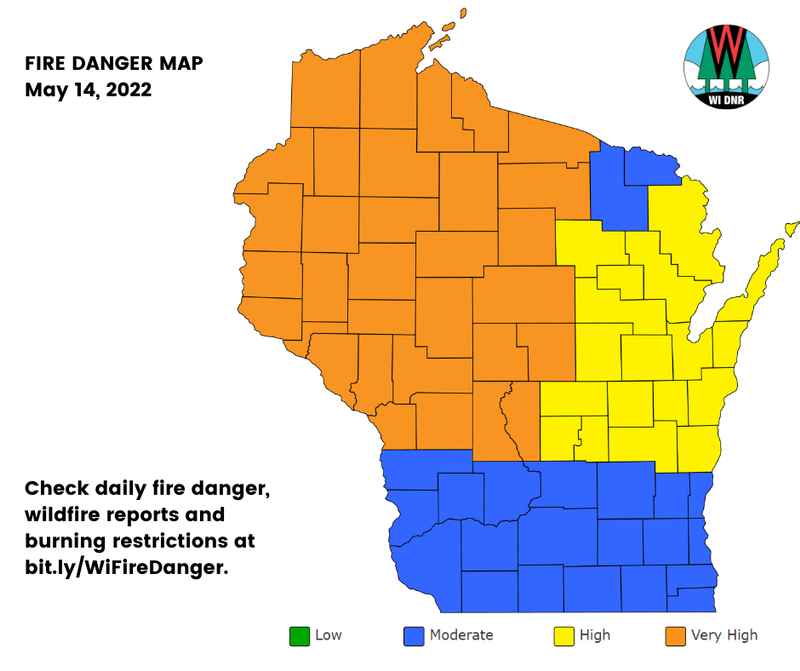Near-critical fire danger across northwest Wisconsin

Wisconsin fire danger for May 14, 2022[Wisconsin DNR]
Dry and breezy conditions, combined with low relative humidity, are creating near-critical fire conditions across northwest Wisconsin. The Wisconsin DNR is asking the public to avoid burning in this area.
All DNR-issued annual and special burning permits for debris piles, burn barrels, and prescribed burns are suspended in the counties with very high fire danger where the DNR has authority.
Ashland, Bayfield, Burnett, Douglas, Iron, Price, Sawyer, and Washburn counties all have very high fire danger today. Other areas with very high fire danger today include Adams, Barron, Buffalo, Chippewa, CLark, Dunn, Eau Claire, Jackson, Juneau, La Crosse, Lincoln, Marathon, Monroe, Oneida, Pepin, Pierce, Polk, Portage, Rusk, St. Croix, Taylor, Trempealeau, Vilas, and Wood counties.
Areas with high fire danger include Brown, Calumet, Door, Fond du Lac, Green Lake, Kewaunee, Langlade, Manitowoc, Marinette, Marquette, Menominee, Oconto, Outagamie, Shawano, Sheboygan, Waupaca, Waushara and Winnebago counties.
The Wisconsin DNR has responded to 411 wildfires burning more than 606 acres so far this year, most of which were related to debris burning. Debris burning is the number one cause of wildfires.
With the near-critical fire conditions, any fire could quickly start and spread. The Wisconsin DNR is asking the public to avoid all outdoor burning, including limiting the use of campfires. Caution is also advised when using off-road vehicles or equipment that can create a spark and start a fire.
As fire danger and burning restrictions change every day, the DNR recommends the following fire safety tips:
- Avoid all outdoor burning until conditions improve. Burn permits for debris burning are currently suspended in numerous counties.
- Operate equipment (chainsaws, off-road vehicles, lawn mowers, etc.) early in the morning or late in the day to avoid sparks at peak burn hours.
- Secure dragging trailer chains.
- Delay having campfires until the evening hours as fire conditions tend to improve; keep them small and contained. Make sure they are completely extinguished before leaving them unattended.
- Report fires early, dial 911.
Check daily fire danger, wildfire reports and burning restrictions on the DNR website at bit.ly/WiFireDanger.